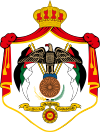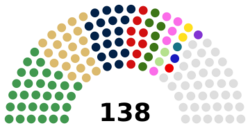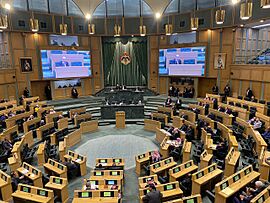House of Representatives (Jordan) facts for kids
Quick facts for kids House of Representativesمجلس النواب |
|
|---|---|
| 20th Parliament of Jordan | |
 |
|
| Type | |
| Type |
Lower house of the Parliament of Jordan
|
| History | |
| Founded | 16 April 1928 (British protectorate) 1 January 1952 (current form) |
| Leadership | |
|
Speaker
|
Ahmed Safadi, Independent
Since 15 November 2022 |
| Structure | |
| Seats | 138 |
 |
|
|
Political groups
|
|
|
Length of term
|
4 years |
| Elections | |
| Open list proportional representation (18 seats reserved for women, 7 for Christians, and 2 for Chechens and Circassians) | |
|
Last election
|
10 September 2024 |
|
Next election
|
2028 |
| Meeting place | |
 |
|
| Chamber of the House of Representatives Jordanian Parliament Building Al-Abdali, Amman |
|
| Website | |
| representatives.jo (English) | |
| Constitution | |
| Constitution of Jordan | |
The House of Representatives of Jordan (Arabic: مجلس النواب, romanized: majlis an-nuwāb) is an important part of the government in Jordan. It is the elected "lower house" of the Jordanian parliament. This means it works alongside the Senate to create and pass laws for the country.
The House of Representatives has 138 members. These members are chosen by the people of Jordan in elections. Each member serves for a period of four years.
Members are elected using a special voting system. Each person gets to cast two votes. One vote is for individuals running in 18 local areas, called districts. The other vote is for political parties in a national election. Out of the 138 seats, 97 are for representatives from these local districts. The remaining 41 seats are for representatives from the national party lists. There are also special seats set aside for certain groups. For example, 18 seats are for women, 7 for Christians, and 2 for people from the Circassian and Chechen communities.
The person in charge of the House of Representatives is called the Speaker.
History of the House
For a long time, the Jordanian House of Representatives mostly had members who did not belong to any political party. This was known as a nonpartisan system. Most representatives worked independently.
However, after the elections in September 2024, things changed. For the first time, the parliament started to have a system where political parties play a bigger role. This means more members now belong to specific political parties.
See also
 In Spanish: Cámara de Representantes de Jordania para niños
In Spanish: Cámara de Representantes de Jordania para niños
- Category:Members of the House of Representatives (Jordan)
 | Tommie Smith |
 | Simone Manuel |
 | Shani Davis |
 | Simone Biles |
 | Alice Coachman |

